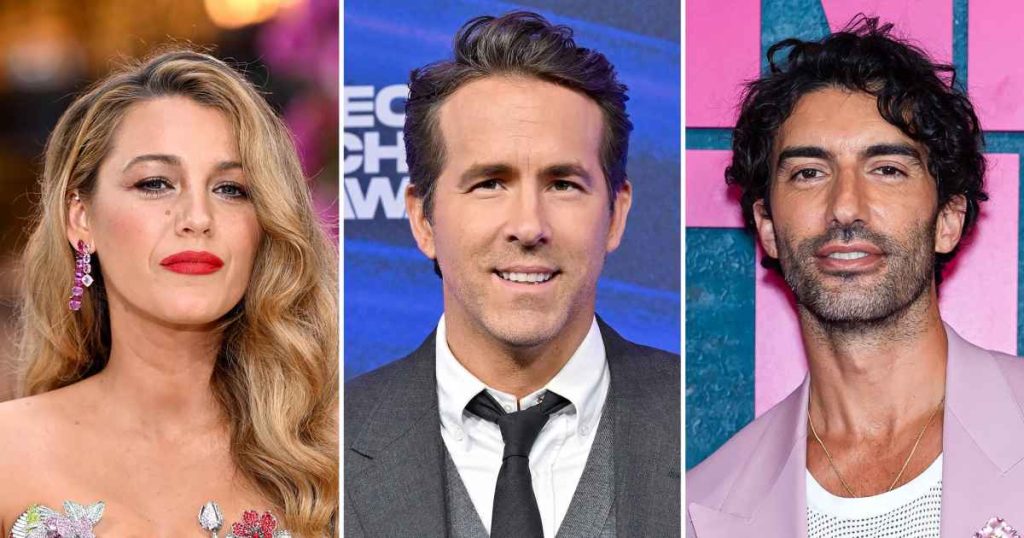The ongoing legal battle between Blake Lively, Ryan Reynolds, and Justin Baldoni has captivated public attention for months, stemming from Lively’s allegations of sexual harassment against Baldoni during the filming of their movie, “It Ends With Us.” The conflict, originating from alleged on-set tensions, escalated dramatically into a multi-million dollar legal entanglement involving accusations of defamation, extortion, and manipulation. While Lively seeks justice for the alleged harassment and subsequent reputational damage, Baldoni vehemently denies the claims, portraying himself as the victim of a calculated smear campaign. The case has become a complex web of accusations, counter-accusations, and leaked evidence, leaving the public to decipher the truth amidst the conflicting narratives.
The initial spark ignited in August 2024 with rumors of a strained relationship between Lively and Baldoni during the film’s promotion. These whispers culminated in December 2024 with Lively filing a complaint against Baldoni and his production company, Wayfarer Studios, alleging sexual harassment. Lively’s accusations, detailed in a New York Times article, painted a picture of a hostile work environment where she was subjected to “social manipulation” aimed at destroying her reputation. She further claimed that other individuals on the set had also complained about Baldoni’s behavior. Baldoni swiftly denied the allegations and launched a $250 million lawsuit against The New York Times and other parties for their coverage of the accusations.
Lively’s legal pursuit intensified with a lawsuit filed in a New York federal court, mirroring the allegations submitted to the California Civil Rights Department. Her complaint named Baldoni, publicists Melissa Nathan and Jennifer Abel, and Wayfarer Studios, citing breach of contract, infliction of emotional distress, invasion of privacy, and lost wages. Baldoni maintained his denial of all claims, setting the stage for a fierce legal confrontation. The conflict deepened further in January 2025 when Baldoni filed a $400 million lawsuit against Lively, her husband Ryan Reynolds, and her publicist Leslie Sloane. He accused them of civil extortion, defamation, and false light invasion of privacy, claiming they orchestrated a campaign to damage his reputation.
Baldoni’s legal team presented their client’s lawsuit as a response to an overwhelming amount of evidence demonstrating Lively’s attempts to destroy him and his company. They asserted that Lively and her team disseminated manipulated and unsubstantiated information to the media. In contrast, Lively’s legal team dismissed Baldoni’s lawsuit as a desperate attempt to deflect attention from the evidence supporting her claims. They characterized the strategy of attacking the accuser as a common tactic that would ultimately fail. The ensuing legal maneuvering saw both sides attempting to bolster their cases through the release of select evidence. Baldoni’s camp released a video from the film set, aiming to depict a cordial working relationship between the actors. They also released a voice memo apology from Baldoni to Lively, relating to a script dispute, seemingly to portray Baldoni’s conciliatory nature.
As the legal battle intensified, Lively and Reynolds sought a gag order against Baldoni’s attorney, anticipating the launch of a website allegedly supporting Baldoni’s accusations. A pre-trial hearing in February 2025 addressed the gag order request and other procedural matters. The judge cautioned both sides against litigating the case in the press and indicated that Baldoni’s “timeline of relevant events” on his website might be inadmissible. While Baldoni’s team expressed satisfaction with the handling of the pre-trial hearing and their determination to prove their innocence, the conflict remains far from resolved. The overarching legal battle continues, with the trial date initially set for March 2026 potentially being expedited due to the ongoing public nature of the dispute.
The Lively-Reynolds-Baldoni case presents a multifaceted legal and public relations challenge. The conflicting narratives and accusations of manipulation create a complex and evolving story. The eventual outcome of the legal proceedings will significantly impact the careers and reputations of all involved. Beyond the immediate legal ramifications, the case raises broader questions about power dynamics in the entertainment industry, the handling of harassment allegations, and the role of public opinion in shaping the narrative of such disputes. As the trial approaches, the legal teams will continue to strategize, present evidence, and attempt to sway public perception. The ultimate verdict will not only determine the legal victors but also contribute to the ongoing conversation about accountability and justice in the face of such accusations.

